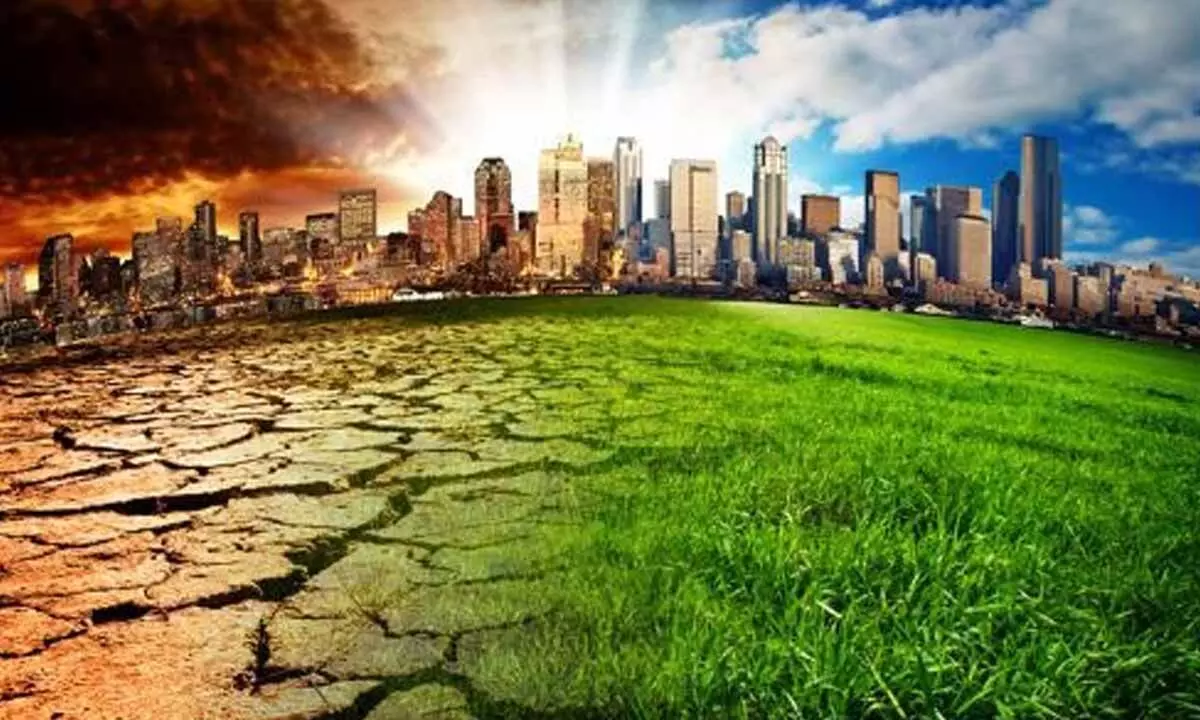Walk the talk on climate action front

Andhra Pradesh government sets up climate change cell
Is climate change irretrievably causing global havoc? Is it past the prevention measures?
Is climate change irretrievably causing global havoc? Is it past the prevention measures? We are not there, yet; however, the pace at which the climate change is taking place – the word itself sounds so benign as not to take it seriously – the way it poses threat to humanity in form of extreme weather events, extinction of species, droughts and forced migrations, it can be certainly graded as a global threat, on a par with wars.
Our planet is warmer now than ever before in the last 8,00,000 years. The humanity is gobbling up resources faster than the planet can regenerate. Just look at the enormous amounts of carbon dioxide emitted in the process, especially since mid-20th century. Record-breaking heat was witnessed across the globe continent. Temperatures soared to as high as 52.2 degree Celsius in China’s Sanbao and Beijing even had to put a temporary ban on outdoor work due to unbearable heat. Beijing also witnessed a severe sandstorm.
In the most shocking floods in the Libyan city of Derna, over 4,300 people were killed on September 10, 2023. Los Angeles was blanked by snow in February last year, paralysing life. Cyclone Freddy in Southeast Africa was said to have claimed over 1,000 human lives and displaced thousands. It also contributed to cholera outbreak in Malawi. The unusual spread of heatwaves hit Australia hard in September and normal temperatures went by as much as 12 degrees. Then, Category five Typhoon Mawar ripped apart habitations in the Philippines, Japan, Taiwan, and Guam. At 289 km per hour it was the strongest storm in 2023. Wildfires claimed several lives in many continents and laid waste thousands of hectares. The Horn of Africa comprising Djibouti, Eritrea, Ethiopia, and Somalia has been experiencing a severe drought for the last three years.
Only a few events could be mentioned here for want of space, but should suffice to alert civil societies and governments to advance the global understanding of how the changing climate is wreaking havoc after havoc, in form of extreme weather events. Awareness will lead to concerns and set off debates to find solutions.
Extreme heat is set to break records in 2024, too. Humanity is on a trajectory to experience the hottest February in recorded history, according to the Berkeley Earth scientist Zeke Hausfather, The Guardian reported. Not just that, climate change is also driving human-animal as well as plunging nations into war over resource-rich regions. On February 16-18, the 60th Munich Security Conference debated on the security implications of climate change. Climate change took centre-stage at the recent World Economic Forum meet. The COP28 meet had committed to net-zero operations by 2050, near-zero methane in upstream operations by 2030, zero routine flaring by 2030, and increased transparency in emissions reporting. However, till February 2025, we won’t see any substantial climate action plans from the signatories.
All said, pledged, and done, one has to admit that climate finance lies at the heart of climate action. The world’s rich countries have not kept their pledge of $100 billion a year. Experts say this may cross $ 200 billion a year by 2030. Effecting transition to green energy from fossil fuels, accelerating adoption of electric vehicles, solar power etc., need finance and multilateral funding agencies have to step up. Net-zero scenario i.e., carbon neutrality by 2050 alone requires $1 trillion, estimates say. Save for pouring forth on what must be done, rich nations are lethargic in funding climate action.














